
Seydou Koné, better known by his stage name Alpha Blondy, is an Ivorian reggae singer and international recording artist. Many of his songs are politically and socially motivated, and are mainly sung in his native language Dyula, French and English, though he occasionally uses other languages, for example, Arabic or Hebrew.
Makossa is a music genre originating in Douala, Littoral Region, French Cameroons in the late 19th century. Like much other music of Sub-Saharan Africa, it uses strong electric bass rhythms and prominent brass. Makossa uses guitar accompaniments, in the forms of solo and rhythm guitar, with a main singer and a choir of backup singers, with the focus being on the texture of the guitar, the role it plays in the song, the relationship between it and other instruments, the lyrical content and languages sung as well as their relationship with the music, the uses of various percussion instruments, including the bottle, the groove of the bass as well as the drums, and the use of technical knowledge and microprocessors to make the music. It is in common time (4/4) for the vast majority of cases. Language-wise, it is typically sung in French, Duala or Pidgin English. Tempo-wise, it is typically in between 130 and 170 BPM. It traditionally consisted of guitar-picking techniques that borrows from bikutsi; with a guitar-structure of a guitar switching from solo to rhythm from assiko; supplanted with complex bass grooves, and gradually picked up on brass section, from funk and later in the 70s, string section, from disco. It along with this acquired the sebene from Congolese rumba. In the 1980s makossa had a wave of mainstream success across Africa and to a lesser extent abroad. It is considered to be one of the greatest Cameroonian and even African "adventures" as a music.

The Specials, also known as The Special AKA, were an English 2 tone and ska revival band formed in 1977 in Coventry. After some early changes, the first stable lineup of the group consisted of Terry Hall and Neville Staple on vocals, Jerry Dammers on keyboards, Lynval Golding and Roddy Radiation on guitars, Horace Panter on bass, John Bradbury on drums, and Dick Cuthell and Rico Rodriguez on horns. The band wore mod-style "1960s period rude boy outfits ". Their music combines the danceable rhythms of ska and rocksteady with the energy and attitude of punk. Lyrically, their work presented overt political and social commentary.

The balafon is a gourd-resonated xylophone, a type of struck idiophone. It is closely associated with the neighbouring Mandé, Bwaba Bobo, Senoufo and Gur peoples of West Africa, particularly the Guinean branch of the Mandinka ethnic group, but is now found across West Africa from Guinea, Burkina Faso, Mali. Its common name, balafon, is likely a European coinage combining its Mandinka name ߓߟߊ bala with the word ߝߐ߲ fôn 'to speak' or the Greek root phono.

The music of the Cameroon includes diverse traditional and modern musical genres. The best-known contemporary genre is makossa, a popular style that has gained fans across Africa, and its related dance craze bikutsi.

Senegal's music is best known abroad due to the popularity of mbalax, a development of conservative music from different ethnic groups and sabar drumming popularized internationally by Youssou N'Dour.
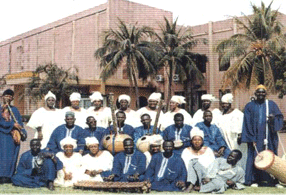
The music of Mali is, like that of most African nations, ethnically diverse, but one influence predominates: that of the ancient Mali Empire of the Mandinka. Mande people make up around 50% of Mali's population; other ethnic groups include the Fula (17%), Gur-speakers 12%, Songhai people (6%), Tuareg and Moors (10%).

Chief Sunday Adeniyi Adegeye, known professionally as King Sunny Adé, is a Nigerian jùjú singer, songwriter and multi-instrumentalist. He is regarded as one of the first African pop musicians to gain international success, and has been called one of the most influential musicians of all time.

The Mandinka or Malinke are a West African ethnic group primarily found in southern Mali, the Gambia, southern Senegal and eastern Guinea. Numbering about 11 million, they are the largest subgroup of the Mandé peoples and one of the largest ethnic-linguistic groups in Africa. They speak the Manding languages in the Mande language family, which are a lingua franca in much of West Africa. Virtually all of Mandinka people are adherent to Islam, mostly based on the Maliki jurisprudence. They are predominantly subsistence farmers and live in rural villages. Their largest urban center is Bamako, the capital of Mali.
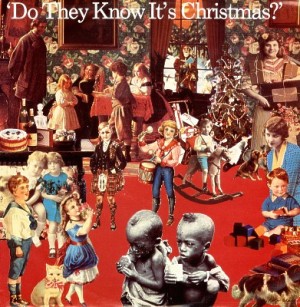
"Do They Know It's Christmas?" is a charity song written in 1984 by Bob Geldof and Midge Ure to raise money for the 1983–1985 famine in Ethiopia. It was first recorded by Band Aid, a supergroup assembled by Geldof and Ure consisting of popular British and Irish musical acts. It was recorded in a single day at Sarm West Studios in Notting Hill, London, in November 1984.
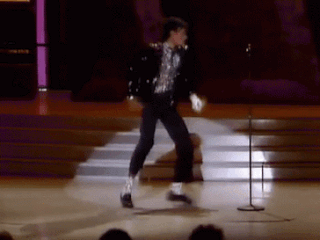
The moonwalk, or backslide, is a popping dance move in which the performer glides backwards but their body actions suggest forward motion. It became popular around the world when Michael Jackson performed the move during the performance of "Billie Jean" on Motown 25: Yesterday, Today, Forever, which was broadcast in 1983. He included the moonwalk in tours and live performances. Jackson has been credited as renaming the "backslide" to the moonwalk and it became his signature move.

The culture of the Democratic Republic of the Congo is extremely varied, reflecting the great diversity and different customs which exist in the country. Congolese culture combines the influence of tradition to the region, but also combines influences from abroad which arrived during the era of colonization and continue to have a strong influence, without destroying the individuality of many tribal customs.
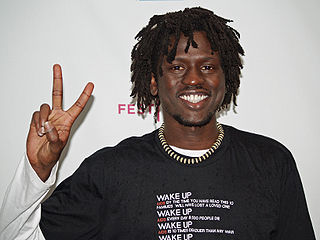
Emmanuel Jal is a South Sudanese-Canadian artist, actor,author, former child soldier, and political activist. His autobiography, War Child: A Child Soldier's Story, was published in 2009.
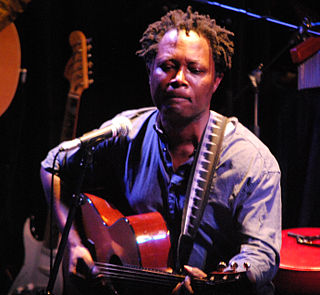
Pascal Lokua Kanza, known professionally as Lokua Kanza, is a Congolese singer, songwriter, arranger, producer, and multi-instrumentalist. He is known for his soulful, folksy sound, which is atypical of the dancefloor-friendly African rumba music that is common in the Democratic Republic of the Congo. His proficiency in blending different musical styles and cultural influences has made him a celebrated artist, admired for his distinctive and evocative musical creations. He sings in French, Swahili, Lingala, Portuguese, English, and Wolof. He was a member of the coaching panel of The Voice Afrique Francophone from 2016 to 2017.
The "Freedom Come-All-Ye" is a Scots language song written by Hamish Henderson in 1960.
The Pioneers are a Jamaican reggae, soul and rocksteady vocal trio, whose main period of success was in the 1960s. The trio has had different line-ups, and still occasionally performs.

Too Much Too Young - The Special A.K.A. Live! is a live EP by The Specials with Rico Rodriguez, released on 11 January 1980. On the original release, the front cover credited the performers as The Special A.K.A. featuring Rico, while the back cover mentions and the labels credited only The Specials.
Barbara Kanam Mutund, known professionally as Barbara Kanam, is a Congolese singer-songwriter, music producer, actress, philanthropist, and currently serves as the Director General of the Cultural Promotion Fund of the Democratic Republic of the Congo. She sings in French, Swahili, Lingala, and English.

Martin Meissonnier is a French musician, producer, journalist, and filmmaker. He is known for his work with African pop musicians such as Fela Kuti and King Sunny Adé and Khaled among other diverse artists. His producing and film directing credits include documentaries about finance, politics and history.

"Magic in the Air" is a 2014 single by Ivorian musical group Magic System, featuring Moroccan singer Chawki and produced by Moroccan producer RedOne. The track also appears on Magic System's album Africainement vôtre, released on 19 May 2014.















